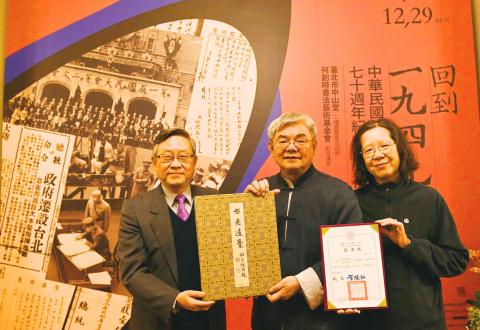National Tsing Hua University chair professor of philosophy Yang Rur-bin (楊儒賓) has donated to the university’s museum his personal collection of more than 2,000 historical pieces collected by the Chinese Nationalist Party (KMT) during its retreat from China to Taiwan in 1949.
Yang and his wife, Fang Sheng-ping (方聖平), who is also a chair professor at the university, on Saturday last week donated the relics, whose themes include war, politics, religion and economy. The couple has taught at the university for more than 30 years
The relics are to be on display at Taipei’s Zhongshan Hall (中山堂) until Dec. 29.

Photo courtesy of National Tsing Hua University
The university said that the museum, which is under construction, would open to the public in 2022.
The collection includes correspondence by major politicians and religious leaders on issues such as victory in the Second Sino-Japanese War, the evacuation of citizens from the Ta-chen Islands (大陳群島), the retreat of the KMT government to Taiwan and the subsequent cross-strait situation.
Residents of the Ta-chen Islands, off the east coast of China, retreated to Taiwan with KMT troops in 1955.
A letter written by Chiang Kai-shek (蔣介石) in late May 1949 to general Tang Enbo (湯恩伯) is also part of the collection.
In the letter, Chiang ordered that only the minimum amount of gold required to maintain the city finances was to stay in Shanghai, with the rest to be shipped to Taiwan.
Communist troops took over Shanghai only four days after Chiang wrote the letter, making it proof of the urgent need to transport the gold to Taiwan. The gold later became an important source of funds to drive Taiwan’s economic development.
In another letter, Master Wu-shang (無上法師) said he hoped to install the sarira — bead-shaped objects purportedly found among the cremated ashes of Buddhist spiritual masters — of legendary monk Xuanzang (玄奘) in Hsinchu City’s Lingyin Temple (靈隱寺).
Xuanzang traveled overland from China to India in search of Buddhist sutras, a story that has been immortalized in the classic novel Journey to the West.
In the second half of the Second Sino-Japanese War, the Imperial Japanese Army reportedly found Xuanzang’s sarira during construction. It was split into three parts, which were stored in Beijing, Nanjing and Japan.
After the war, Japan agreed to return the part in its possession to the KMT government, sparking a contest between Buddhist leaders in Taiwan. The sarira was eventually sent to Hsuanguang Temple (玄光寺) near Nantou County’s Sun Moon Lake (日月潭) at Chiang’s insistence.
“My salary comes from the university and [as it is a state-funded institution] it is taxpayers’ money, so the donation is simply putting the money back where it came from,” Yang said, adding that he hopes the relics would become treasured parts of the museum’s collection.

Chinese spouse and influencer Guan Guan’s (關關) residency permit has been revoked for repeatedly posting pro-China videos that threaten national security, the National Immigration Agency confirmed today. Guan Guan has said many controversial statements in her videos posted to Douyin (抖音), including “the red flag will soon be painted all over Taiwan” and “Taiwan is an inseparable part of China,” and expressing hope for expedited reunification. The agency last year received multiple reports alleging that Guan Guan had advocated for armed reunification. After verifying the reports, the agency last month issued a notice requiring her to appear and explain her actions. Guan

GIVE AND TAKE: Blood demand continues to rise each year, while fewer young donors are available due to the nation’s falling birthrate, a doctor said Blood donors can redeem points earned from donations to obtain limited edition Formosan black bear travel mugs, the Kaohsiung Blood Center said yesterday, as it announced a goal of stocking 20,000 units of blood prior to the Lunar New Year. The last month of the lunar year is National Blood Donation Month, when local centers seek to stockpile blood for use during the Lunar New Year holiday. The blood demand in southern Taiwan — including Tainan and Kaohsiung, as well as Chiayi, Pingtung, Penghu and Taitung counties — is about 2,000 units per day, the center said. The donation campaign aims to boost

The Kaohsiung Tourism Bureau audited six hotels in an effort to prevent price gouging ahead of Korean band BTS’ concert tour in the city scheduled for Nov. 19, 21 and 22 this year. The bureau on Friday said that the audits — conducted in response to allegations of unfair pricing posted on social media — found no wrongdoing. These establishments included the local branches of Chateau de Chine, Hotel Nikko, My Humble House, and Grand Hai Lai, it said, adding that the Consumer Protection Commission would have penalized price gougers had the accusations been substantiated. The bureau said the Tourism Development Act

BACK TO WINTER: A strong continental cold air mass would move south on Tuesday next week, bringing colder temperatures to northern and central Taiwan A tropical depression east of the Philippines could soon be upgraded to be the first tropical storm of this year, the Central Weather Administration (CWA) said yesterday, adding that the next cold air mass is forecast to arrive on Monday next week. CWA forecaster Cheng Jie-ren (鄭傑仁) said the first tropical depression of this year is over waters east of the Philippines, about 1,867km southeast of Oluanpi (鵝鑾鼻), and could strengthen into Tropical Storm Nokaen by early today. The system is moving slowly from northwest to north, and is expected to remain east of the Philippines with little chance of affecting Taiwan,